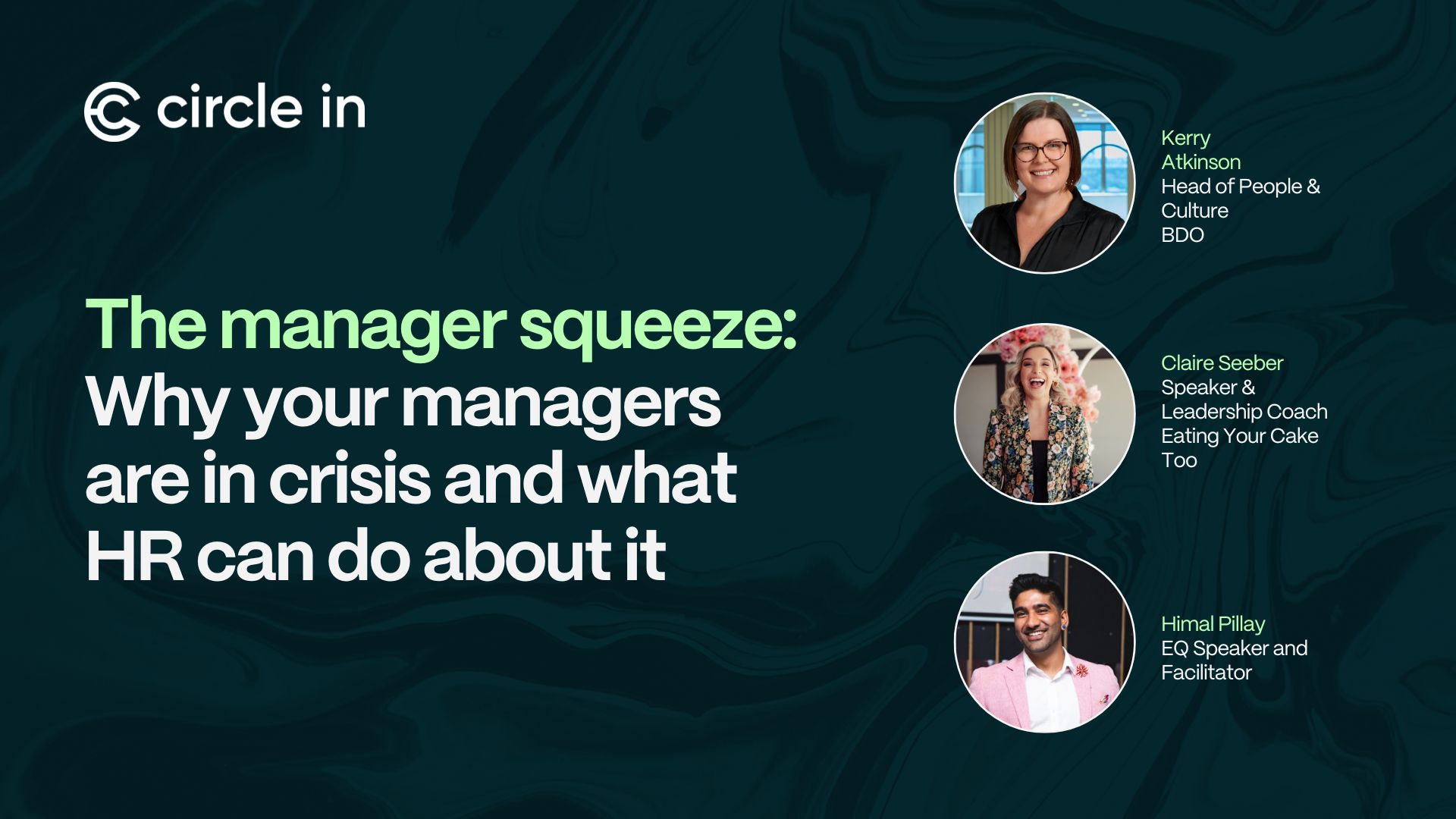Why your managers are in crisis and what HR can do about it
The balancing act of middle management right now is a slippery slope – managers are constantly being pulled in different directions, trying to meet the demands from above, lead teams effectively, and handle their own workload. It’s a tough gig, but it doesn’t have to be overwhelming. Let’s explore some practical changes organizations can make to help navigate the challenges, lessen the load, and support managers to thrive in their roles. Because we all know, when they do, everyone benefits: managers, teams, and entire organizations.
Tackling the Overwhelm
Overwhelm. We’ve invariably all felt it at some point in our working lives, but right now it’s omnipresent, especially for middle managers. In fact, 75% of managers say they are experiencing stress and burnout*. Managers are overwhelmed because they are expected to execute strategies handed down from upper management while simultaneously coaching and developing their teams. The thing is, many managers lack the necessary skills to effectively balance these responsibilities. Add to that, the shortage of skilled professionals in the job market, managers are left feeling under-resourced and overburdened – being forced to not only implement strategies and mentor their teams but also to actively engage in day-to-day tasks.
“Managers are being pulled like pork buns in every which direction but also coupled with organizations that are moving so quickly, with the goal posts also shifting so quickly that it’s hard to keep up.” – Claire Seeber, Career and Leadership Coach at Eating Your Cake Too
Redefining work environments
But here’s the thing: it’s time for organizations to step up and rethink and redesign how they approach stress management and create work environments that support manager wellbeing. And it can’t just be about stress balls and nature walks anymore – it must be about solutions that actually work. The staggering statistics ($12B+ according to the Productivity Commission) on mental health-related costs in absenteeism and staff turnover in Australia alone, highlights the urgent need for action. Managers are increasingly finding themselves playing the role of a psychologist, spending significant time navigating difficult conversations and personal issues within their teams. Organizations need to acknowledge the multifaceted challenges managers face and provide tailored support, training, and resources to enable them to thrive in their roles while maintaining their own wellbeing.
“The way forward, the way that we want to address these things is not to make people better at managing stress it’s about redesigning a working environment where people actually want to come to work, and they want to stay as well.” – Himal Pillay, Founder & Director at Realign
Bridging the Gap: From Expert to Leader
Many technical experts find themselves thrust into managerial roles but the transition from expert to leader isn’t always easy, especially without adequate preparation for the challenges of leadership. Excelling in technical tasks is one thing, but managing people requires an entirely different skill set. Add to that the complexities of a diverse workforce comprising multiple generations, managers must navigate varying demands and expectations. Organizations need to invest in equipping managers with leadership skills and training to ensure their success and avoid the detrimental consequences of burnout and turnover. An intentional and targeted effort educating employees across all levels of the organization in what it really means to be a manager and keeping it real about the types of conversations prospective managers will need to have, means organizations get on the front foot with the mindset transition needed to be a good manager. It also means people are given a safe space to say that management may not be for them, before it’s too late!
Unlocking the Power of Emotional Intelligence
Emotional intelligence and empathy go hand in glove with effective management, not only enabling managers to navigate challenging situations but also empowering them to positively influence their teams. But they’re not always skills that come naturally to everyone. The good news is they can be taught and harnessed over time. Organizations need to prioritize upskilling managers in emotional intelligence to create a supportive workplace culture where open communication and feedback are encouraged. What’s more, establishing a feedback culture, both upwards to leaders and downwards to teams promotes a culture of trust and psychological safety, allowing for honest conversations and meaningful connections. Ultimately, investing in emotional intelligence training equips managers with the tools they need to lead with empathy, communicate effectively, and cultivate a supportive work environment.
“I’d have to say big ticket items, feedback culture, training and developing your people to be confident and able to have those discussions with empathetic lens. And I’m also a big fan of starting from a position trust. So having those conversations openly and honestly and creating a safe space.” – Kerry Atkinson, Head of People and Culture, BDO
Beyond One-and-Done: Investing in Continuous Learning
Gone are the days of one-and-done training sessions. If we want to see real and lasting change, we need to invest in continuous learning and support. That means providing ongoing development opportunities, like training, mentoring, and peer support networks. Even The World Economic Forum’s Future of Skills report highlighted lifelong curiosity and learning as essential skills for personal and organizational growth. Lifelong learning isn’t just about acquiring knowledge; it’s about fostering a mindset of growth and adaptability essential for navigating the complexities of the modern workplace.
“Consistency is key, because if we’re just doing it as an isolated event one time, we then can’t be surprised when it doesn’t stick, or it doesn’t permeate through the organization.” – Claire Seeber, Career and Leadership Coach at Eating Your Cake Too
Creating a Culture of Growth and Wellbeing
Workplace wellbeing for managers is not just a nice-to-have; it’s an essential component of organizational success. The traditional approach of pushing solutions onto middle managers often misses the mark. What’s better (and what’s a growing expectation in the workplace) is that managers will be pulled into the conversation first – to have their challenges and struggles heard firsthand. Cultivating a work culture where employees feel heard, understood, and valued fosters a sense of belonging and drives retention. It also celebrates the power of shared responsibility and collective contribution. Part of this is regular, open and transparent feedback delivered within a psychologically safe environment. By aligning internal feedback cultures with external support systems, organizations can create environments where managers thrive, bringing out the best in themselves and their teams.
“I am not a fan of the HR sandwich. Let’s just give the feedback. I always say to people in this organization, to people in my team, deliver the message with kindness. Feedback is a gift; give it as such and receive it as such. And in a psychologically safe environment.” – Kerry Atkinson, Head of People and Culture, BDO
*The Unsaid (Circle In research of 1,022 managers), 2024


